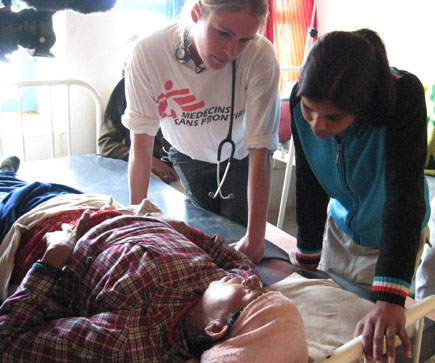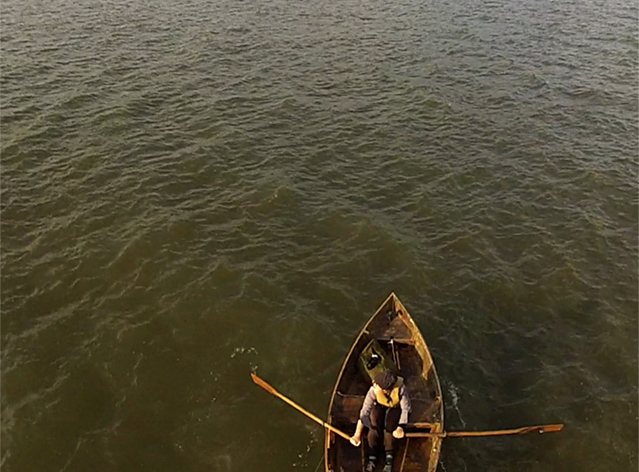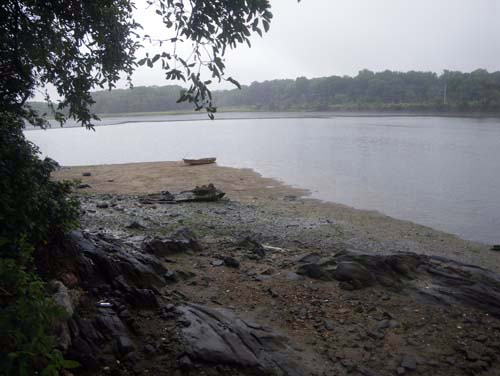Might it look like this?
From Fake is the New Real
1.31.2010
A balanced electoral college
Posted by Shin-pei at 12:44 PM 1 comments
1.24.2010
Here it is, a plan to plan
I knew someone had figured this out. Absolutely, the first response is not one of reconstruction...here's some ideas for the long-term.
Posted by Shin-pei at 11:08 AM 0 comments
1.21.2010
Hm...at least it's now serving bus riders

image source
...and not just car drivers, but on the plus side, this also prevents people from circling around looking for a spot...but still. You have to give to get. Check it out: Roadify, a service for community transportation driven by user-input. I like the idea of BusAroundMe, now possibly augmented with MTA data?
Posted by Shin-pei at 11:50 AM 0 comments
Can't get enough of this
Cut a break, it's related to cities after all!
Posted by Shin-pei at 9:15 AM 3 comments
1.18.2010
In public service
This is a little rumination I've been sorting out, so apologies upfront for the rudimentary nature. If I've been workshopping in my head, BttN seems to be a good spot to lay everything down and geek out.
I've been spending some time thinking about the multitude of ways planners can contribute to change; learning about the situation in Haiti has made it more immediate. (To be honest, I was also inspired by the Bauhaus exhibit at MoMA where examples abound of workshopping and testing the flex of combining multiple disciplines to contribute to society.) Other professions have figured out a succinct and valuable way to apply the skills of their profession for public service. Examples of those groups include Medicins sans Frontieres/Doctors Without Borders, Union of Concerned Scientists and Architecture for Humanity. There are myriad smaller organizations that do similar work: engineers working on eradicating TB, architects working on affordable, community-based sustainability, for example. All of these groups are emblematic of specific knowledge and skills applied to a specific situation. Sometimes the need is much more immediate, as in Haiti. Other times, it's a longer-term need. Doctors may be the only profession with a common oath; however, it seems that the creation of the organizations is an implicit recognition that many other professions also have distinct power through their specific knowledge to save lives and make people's lives better.
What would a so-called Planning Corp do? Sorting through this brings up more questions than answers. Fundamentally, what do planners do? They help make decisions about how the built environment will be formed, how the natural and built environments will relate to one another, and all with the goal of making people's lives better. Planners collect data, and conduct research and analysis against an understanding of space. How does planning happen? Through a series of decisions, sometimes through an established public process or a private development process, usually a combination of both. How do those decisions get made? What's required to make them? Yikes. The arc of planning always seems long-term; what do planners have to offer in the short-term?
(In disaster situations, there must be (hopefully?!) a typology of responses that has been established among relief agencies. The process of response also carries with it a geo-political context. For example, without knowing the particulars, the decision to cede control of the airport to the U.S. seems loaded. Who gets to go into Haiti - what groups? Who receives access to resources to set up and has legitimacy to be there? Who decides?)
Planners often get lumped with architects and designs. A quick look through the Architecture for Humanity opportunities list shows that the focus on the building facility first; the design process proceeds from that starting point. Architects probably take on a huge amount of the planning responsibilities too, but it's hard to know where that starts and ends. There's Architects, Planners and Designers for Social Responsibility too; role? It would be interesting to follow-up with folks who worked on the Katrina reconstruction and see what lessons and best practices could be found.
I think it's dawned on everyone that the practice of planning needs to extend beyond the effort of making the planning process more inclusionary - or maybe the definition of inclusion needs to be expanded. Though that aspect of planning is absolutely necessary, planning as a discipline seems to have to make a bigger change than just getting community input per se.
Outside of physical design, planners also deal with a lot of data - from how it's defined to how it is collected to how it is communicated. I've become more and more curious about open data and the politicalization of analysis and access, thanks to the nudging of a couple of good folks in NYC. I guess it's about time! In this vein, the CrisisCamp response to the Haiti situation seems extremely appropriate and efficient. The application of data across space is very much an exercise in planning - but participation seems very much defined by computer program developers, not planners (the CrisisCamp folks made a great effort to include a role of non-techies in the projects).
Mobile app developers working on Creole/English tool at Haiti CrisisCamp DC
So I'll put it out there: what do you think a Planning Corp would do? If planners had to band together to respond to crisis, to injustice, to social change, in the long-term and short-term, what would they bring to the world? Sometimes I try something more specific: what would the Hippocratic Oath be for planners? And finally, what's missing here?
Posted by Shin-pei at 12:51 PM 2 comments
1.13.2010
Grand Army Plaza - book release!

The fine folks at Design Trust for Public Space have released the book (free download available) on the Reinventing Grand Army Plaza design competition. The book looks wonderful - they always kick out stellar publications, those people.
If you'd like to get involved with the ongoing improvements at Grand Amy Plaza, there are a lot of opportunities through GAPco, the community-based coalition led by residents, business owners, elected officials, and among them, quite a few folks who are experts in public space and transportation. The first meeting is coming up soon...check the web site for updates.
This is a great example of organizing, coalition building, ideas design competition - all leading to physical changes in this space.
Posted by Shin-pei at 12:17 AM 0 comments
1.11.2010
For the love of bikes
Recent industrial design Pratt grad Vanessa Marie Robinson has a few great ideas to make biking easier, safer and much more stylish up on her awesome blog, for the love of bikes.
A cool bike bag with expandable helmet area...
Reflective riding gloves that don't scream spandex warrior...
A bicycle tool utility bench for our tiny NYC apartments...

Posted by Shin-pei at 6:10 PM 0 comments
1.08.2010
New old news

source
Britta/Window Farms reached its fundraising goal!
Another discussion about defining blight...
Posted by Shin-pei at 6:15 PM 0 comments
What is Affordable Housing?

Center for Urban Pedagogy only gets better and better. It launched this new project, Envisioning Development, that investigates first, "What is Affordable Housing?" Awesome!! Check out the map. Looks like Zoning and ULURP are next in line...
From CUP:
Our work grows from a belief that the power of imagination is central to the practice of democracy, and that the work of governing must engage the dreams and visions of citizens. CUP believes in the legibility of the world around us. What can we learn by investigation? By learning how to investigate, we train ourselves to change what we see.Yes, yes, yes, and yes!
Posted by Shin-pei at 1:41 PM 0 comments
1.07.2010
Modern Shipwrecks
"My belief is that uncertainty brings about a heightened awareness of place." - Marie Lorenz
Anyone who's traveled to a different country knows how much this rings true. I heard Marie Lorenz's talk at the Gel conference back in 2007; she was one of the more memorable speakers. I love her deep commitment to the basic theme, which is a simple idea - build boat, explore shoreline - with the experiences extremely unpredictable. Her execution is impeccable. Simple ideas really are the most brilliant. 
Read her statement and go through the many trips (and maybe one shipwreck) she has taken on the shorelines of New York City. You can view her most recent shipwreck at her opening tomorrow night, January 8, at 6 PM at the Jack Hanley gallery.
Posted by Shin-pei at 8:39 AM 0 comments
1.05.2010
Narrow streets experiments
One can always dream...

westwood boulevard + pico boulevard, west los angeles
...fun to check out.
Posted by Shin-pei at 7:10 PM 0 comments
Looking for good people
Transportation Alternatives is looking for a few good people to intern and hire.
Posted by Shin-pei at 6:37 PM 0 comments